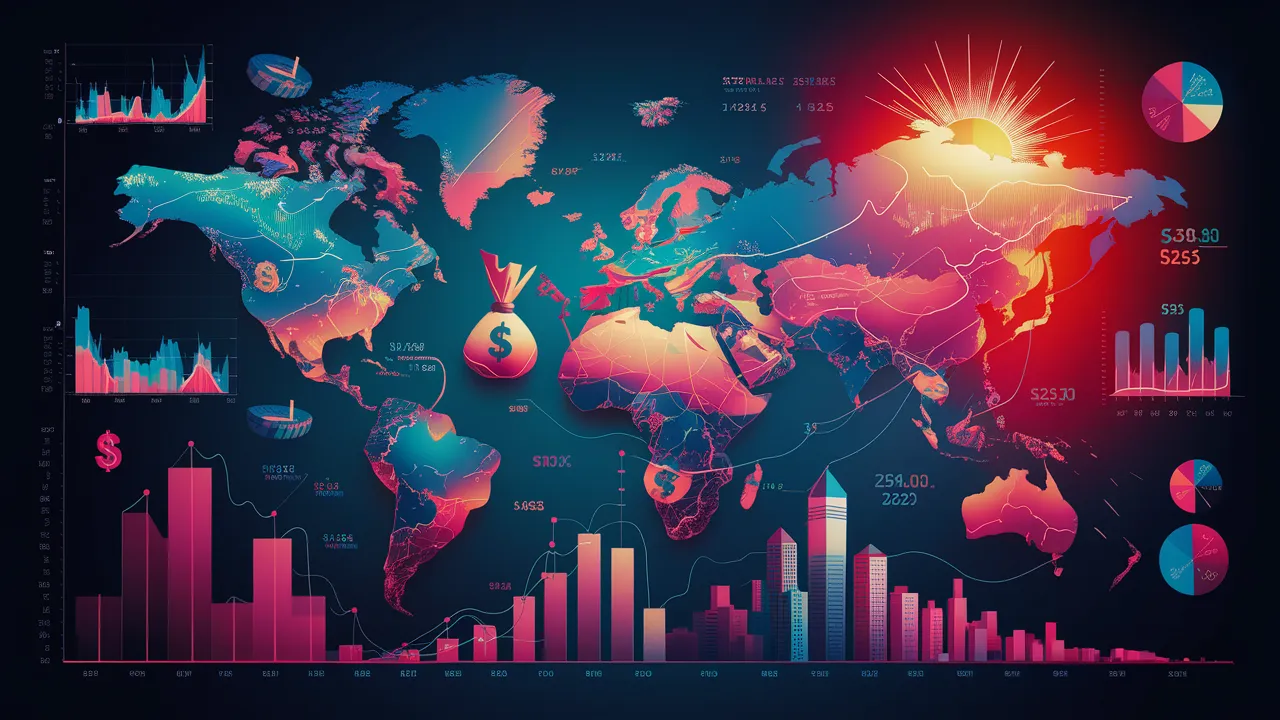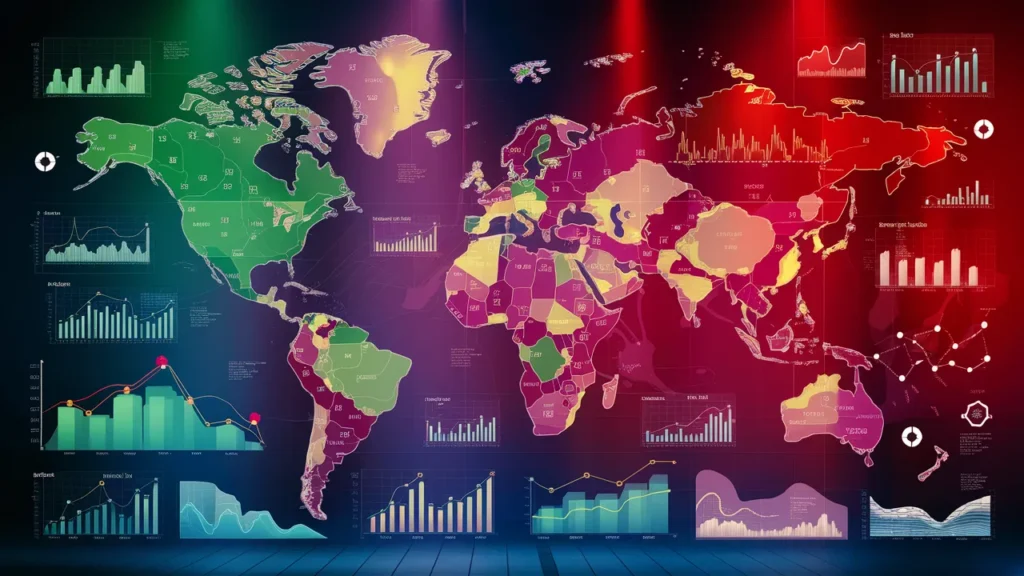
Introduction
As the world becomes increasingly interconnected, understanding global economic trends is vital for businesses, governments, and individuals alike. In this article, we will explore the key insights into current economic trends, examine how these trends may evolve in the future, and provide guidance on how to strategically prepare for economic changes.
Understanding Global Economic Trends
Global economic trends refer to the overarching patterns and shifts that shape economies around the world. These trends are influenced by various factors, including globalization, technological advancements, and political events. Recognizing these trends can offer valuable insights for decision-makers in numerous sectors.
The Role of Globalization in Economic Trends
Globalization has significantly altered the landscape of economic interaction among countries. Through trade, investment flows, and cultural exchange, it facilitates the movement of goods, services, and capital across borders.
While globalization can drive growth and innovation, it also poses challenges such as increased competition and dependency on global supply chains. Countries need to balance the benefits of open markets with the risks of global interdependence. Furthermore, the rise of emerging markets has shifted the focus of globalization, as nations like India and Brazil become key players in the global economy. This shift not only affects trade patterns but also influences global labor markets, as companies seek to capitalize on lower labor costs and expanding consumer bases in these regions.
Impact of Technology on Global Economy
The rapid advancement of technology has transformed the global economy in profound ways. From automation to digital communication, technology has streamlined processes and enhanced productivity in various sectors.
- Automation: Automation is revolutionizing industries, leading to increased efficiency but also raising concerns about job displacement.
- Digital Communication: Improved communication technologies facilitate faster decision-making and broader market access.
- Data Analytics: Companies leverage big data to better understand consumer behavior and improve operational efficiency.
These technological changes not only affect businesses but also redefine consumer expectations, prompting companies to adapt quickly to stay relevant. Moreover, the rise of e-commerce platforms has transformed retail, enabling businesses to reach global audiences with unprecedented ease. This shift not only benefits large corporations but also empowers small businesses and entrepreneurs, allowing them to compete on a larger scale and innovate in ways that were previously unimaginable.
Influence of Political Climate on Economic Trends
The political climate in various regions can substantially influence economic stability and growth. Trade agreements, tariffs, and political unrest can either foster growth or trigger economic downturns.
For instance, changing regulations and shifts in governmental policies can impact foreign investments and create challenges for multinational corporations. Understanding the political nuances in different markets is essential for strategic planning. Additionally, the rise of populism and nationalism in various countries has led to a reevaluation of international trade agreements, which can create uncertainty in global markets. As countries reassess their trade relationships, businesses must navigate a complex landscape of tariffs and regulations that can affect supply chains and pricing strategies.
Key Insights into Current Economic Trends
As we navigate the complexities of the current global economy, several key trends are emerging that are worth noting.
The Rise of Emerging Economies
Emerging economies, particularly in Asia and Africa, are experiencing significant growth and are expected to play a pivotal role in the global economy in the coming years. These regions benefit from youthful populations, increasing urbanization, and growing access to technology.
For businesses, this presents new opportunities to enter untapped markets and tailor products to diverse consumer needs. Additionally, the rise of a middle class in these regions is leading to increased demand for goods and services, which can stimulate local economies. This demographic shift is not only reshaping consumption patterns but also encouraging foreign direct investment, as companies seek to capitalize on the burgeoning market potential.
The Shift Towards a Digital Economy
The transition to a digital economy is accelerating, driven by increased internet accessibility and the proliferation of mobile technologies. Companies are increasingly adopting e-commerce, digital payment systems, and online marketing strategies.
- Remote Work: The COVID-19 pandemic has permanently altered work environments, with many organizations embracing remote work models.
- E-commerce Growth: Retailers are prioritizing online sales channels to reach customers directly and efficiently.
- Blockchain Technology: Blockchain is gaining traction for its potential to improve transaction transparency and security.
This shift not only changes how businesses operate but also how consumers engage with brands. The rise of social media platforms has further transformed marketing strategies, allowing companies to interact with consumers in real-time and create personalized experiences. Moreover, the integration of artificial intelligence and data analytics into business operations is enabling more informed decision-making, optimizing supply chains, and enhancing customer service.
Sustainability and its Economic Implications
Sustainability has emerged as a critical factor in economic planning and consumer decision-making. Increasing awareness of climate change and resource depletion is pushing companies to adopt sustainable practices.
Investors are also increasingly interested in green investments, leading to a rise in companies focusing on Environmental, Social, and Governance (ESG) criteria. This trend is shifting economic incentives, driving growth in clean technology and renewable energy sectors. Furthermore, businesses that prioritize sustainability are finding that they not only attract environmentally conscious consumers but also benefit from cost savings through energy efficiency and waste reduction initiatives. As regulations around sustainability tighten, companies that proactively adapt to these changes are likely to gain a competitive edge in their respective markets.

Future Predictions for Global Economy
The landscape of the global economy is constantly evolving, and several predictions can be made based on current data and emerging trends.
Predicted Economic Power Shifts
Experts predict that economic power will continue to shift towards Asia, particularly China and India. As these nations experience exponential growth, they will likely take on greater roles in global trade and economics.
This shift will necessitate changes in diplomatic relations and economic strategies worldwide, as established economic powers adapt to this new reality. Furthermore, the rise of Asian economies may lead to increased investment in infrastructure and technology within these regions, enhancing their global competitiveness. The Belt and Road Initiative, for example, exemplifies China’s commitment to expanding its influence through infrastructure development, which could redefine trade routes and economic partnerships across continents.
The Future of Work and its Economic Impact
The future of work is expected to be defined by flexibility, remote job opportunities, and a focus on skill development. Organizations will need to embrace new models of work to attract and retain talent in a competitive environment.
As AI and automation reshape job landscapes, workforce re-skilling and up-skilling will become crucial as employees adapt to evolving roles. Moreover, the gig economy is anticipated to expand, providing individuals with diverse income opportunities while also posing challenges regarding job security and benefits. Companies will need to rethink traditional employment models, potentially leading to a more fluid workforce that prioritizes project-based work and collaboration across various sectors.
The Role of AI and Automation in Future Economy
Artificial Intelligence and automation are set to redefine industries, creating both challenges and opportunities. While these technologies promise increased efficiency and innovation, they also raise concerns about job displacement.
To mitigate potential negative impacts, businesses must develop training programs and strategies to help workers transition into new roles that leverage human creativity and problem-solving capabilities. Additionally, ethical considerations surrounding AI deployment will become increasingly important, as companies navigate the balance between technological advancement and social responsibility. The integration of AI into decision-making processes could also lead to improved productivity and resource allocation, but it will require a framework that ensures transparency and accountability in how these systems operate and affect the workforce.
Preparing for the Future: Strategic Economic Planning
To successfully navigate the future economic landscape, strategic economic planning is essential for individuals, businesses, and governments alike. This planning can help organizations remain resilient in the face of unpredictable changes.
Importance of Economic Forecasting
Economic forecasting plays a crucial role in understanding the potential direction of markets and economies. By analyzing trends and historical data, organizations can make informed decisions that align with predicted economic scenarios.
Investing in forecasting tools and leveraging data analytics will be key for organizations aiming to stay ahead of the curve. Moreover, organizations should consider integrating artificial intelligence and machine learning into their forecasting models. These technologies can enhance predictive accuracy by processing vast amounts of data and identifying patterns that may not be immediately apparent to human analysts. This proactive approach allows businesses to anticipate shifts in consumer behavior, commodity prices, and overall economic conditions, enabling them to adjust their strategies accordingly.
Strategies for Adapting to Economic Changes
Being agile and responsive to economic changes is vital for success. Organizations should develop strategies that promote flexibility, innovation, and collaboration. This may involve diversifying supply chains, investing in technology, and fostering a culture of continuous improvement.
Additionally, organizations can benefit from establishing strategic partnerships and alliances that enhance their capabilities and market reach. Collaborating with other businesses, research institutions, and even governmental bodies can lead to shared resources and knowledge, ultimately driving innovation and efficiency. Emphasizing employee training and development is also crucial, as a skilled workforce is better equipped to adapt to new technologies and processes, ensuring that the organization remains competitive in a rapidly evolving economic landscape.
The Role of Policy in Shaping Economic Future
Government policies significantly impact economic conditions. Policymakers play a crucial role in creating an environment conducive to growth through regulations, trade agreements, and fiscal policies.
Staying informed about policy changes and engaging in constructive dialogue with policymakers can help businesses prepare for and respond to upcoming economic shifts. Furthermore, organizations should actively participate in advocacy efforts to influence policy decisions that align with their interests and the broader economic good. By collaborating with industry associations and engaging in public discussions, businesses can contribute to shaping policies that foster innovation, fair competition, and sustainable practices. This proactive engagement not only helps organizations navigate regulatory landscapes but also positions them as responsible stakeholders in the economy.
As we look towards the future, understanding and adapting to these evolving trends will be essential for sustainable growth in an increasingly complex global economy.





